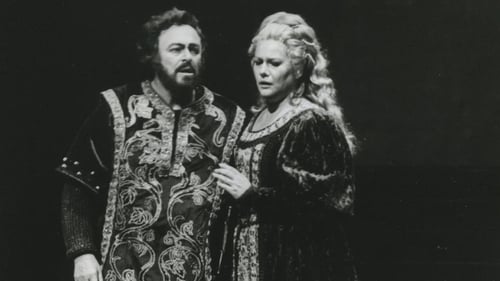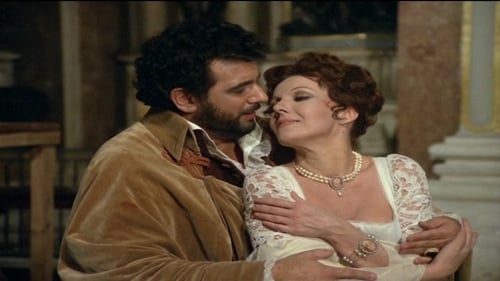Sherrill Milnes
Birth : 1935-01-10, Downers Grove, Illinois, USA

Himself
This tribute to James Levine, first shown on PBS, was only part of that glorious evening. Here we have the whole performance, up to three hours. I could not stop watching these discs. Let me say this much; Levine has done for the Met, making it the premier opera house in the world, what Karajan did with the Berlin, making it one of the finest orchestras ever. So sit back and enjoy.

Jack Rance
Giancarlo Del Monaco’s atmospheric production brings to colorful life a 19th-century mining camp during the California Gold Rush. At the center of the action is the good-hearted bar owner Minnie, sung by Barbara Daniels, who takes a motherly interest in the miners. Plácido Domingo is Dick Johnson, also known as the bandit Ramerrez, who falls in love with Minnie. Sherrill Milnes sings Jack Rance, the sheriff who is not only determined to capture Ramerrez but also wants Minnie for himself. Bloodshed, a crooked poker game, a snowstorm, and a near lynching ensue before Minnie and her bandit-turned-lover can ride off to start a new life. Leonard Slatkin conducts one of Puccini’s most colorful scores.

Pharaoh's daughter Amneris loves general Radames, but he loves slave Aida. Aida's father leads the Ethiopian army to invade Egypt. When he's captured, he wants Aida to gain military secrets from Radames.

Amonasro
AIDA, an Ethiopian princess, is captured and brought into slavery in Egypt. A military commander, Radamès, struggles to choose between his love for her and his loyalty to the Pharaoh. To complicate the story further, Radamès is loved by the Pharaoh's daughter Amneris, although he does not return her feelings. Sonja Frisell’s production captures all the grandeur and excitement of Verdi’s monumental opera, particularly the great triumphal scene where the Egyptian army, led by Radamès (Plácido Domingo), returns victorious from war. Aprile Millo is Aida, the slave girl whose love for Radamès has her squaring off with Amneris (Dolora Zajick), the Egyptian princess who also loves him. Sherrill Milnes is Amonasro, and James Levine leads The Metropolitan Opera Orchestra, Chorus, and Ballet.

Count di Luna
Luciano Pavarotti brings his spectacular voice and artistry to one of the most famous of all tenor roles—Manrico, the ardent troubadour, trapped in an impossible situation by forces beyond his control. The sensational Dolora Zajick, only days after her Met debut, gives an incandescent performance as the demented gypsy Azucena, thirsting for revenge against Count Di Luna (Sherrill Milnes). Eva Marton is the passionate Leonora, desired by both Manrico and the Count, and James Levine brilliantly leads the Met’s orchestra and chorus in some of Verdi’s best-known music.

Simon Boccanegra
Live from the Metropolitan Opera: Simon Boccanegra

Don Carlos
Verdi's early masterpiece is based on a Victor Hugo play with a complicated plot concerning a young woman and the three men vying for her affections—her elderly uncle, a king destined to become Holy Roman Emperor, and a bandit who is actually an overthrown nobleman. Though there is plenty of action arising from the various passions and grudges scattered among these characters, the opera is best appreciated as a feast of beautiful and dramatic Italianate singing. With virtuosic roles for a quartet of principals, the opera delivers one feat of heroic vocalism after another.

Baritono
In Concert at the Met (DVD) - Highlights Five of the Met's greatest stars - Price, Horne, Troyanos, Domingo, and Milnes - joined James Levine for a series of irresistible concert programs, originally telecast in the 1980s. Featuring works by composers ranging from Handel to Meyerbeer to Puccini and Verdi, these performances include some of opera's favorite moments, delivered by a stunning group of legendary artists. Plàcido Domingo, Tatiana Troyanos (February 28, 1982) Leontyne Price, Marilyn Horne (March 28, 1982) Plàcido Domingo, Sherrill Milnes (January 30, 1983)

Rodrigo, Marquis of Posa
Don Carlo (1980) Metropolitan Opera. Verdi / italian. King Philip's court is plagued by rebels, family squabbles and intrigue. The Spanish Inquisition tries to exert its influence. The tension finally ignites at the King's coronation, where heretics are to be burned at the stake

In an Opening Night performance for the history books, the great Plácido Domingo sings the title role of Verdi’s Otello for the first time at the Met. This supremely demanding part was to become his signature role, an accomplishment against which other interpreters are still measured to this day. Domingo stars opposite Sherrill Milnes’s conniving Iago and Gilda Cruz-Romo’s touching Desdemona, all brilliantly conducted by Music Director James Levine.

Renata Scotto is the innocent Luisa, very much in love with Rodolfo (Plácido Domingo in one of his best roles). But he turns out to be the son of the Count Walter (Bonaldo Giaiotti), who has other plans for his aristocratic boy. Enter the evil Wurm (James Morris) whose blackmail eventually backfires, destroying the young lovers despite everything Luisa's father (Sherrill Milnes in a superb performance) does to protect her. James Levine's affectionate conducting and director Nathaniel Merrill's production help make this a performance to treasure.

Tonio
Plácido Domingo accomplishes the rare feat of singing both leads on the same night at the Met in 1978 on opera's most popular double-bill.

Il barone Scarpia
Opera is an inherently theatrical medium that does not lend itself readily to the realism of film treatment. The shining exception is Puccini's Tosca, an action-packed melodrama that unfolds in three taut and gripping acts like the meatiest of Hollywood films noir. And unlike most operas, these three acts are set in three very specific Roman locales. Thus this 1976 film takes place in the church of Sant'Andrea della Valle (Act 1), the Palazzo Farnese (Act 2), and the Castel Sant'Angelo (Act 3).











